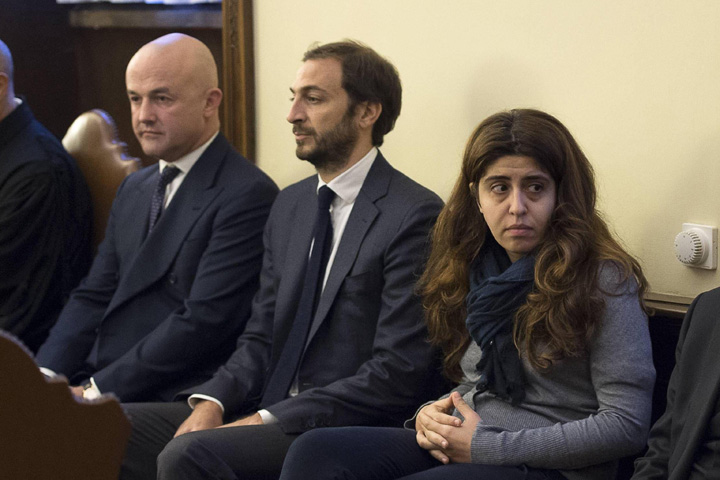
Italian journalists Gianluigi Nuzzi and Emiliano Fittipaldi and laywoman Francesca Chaouqui in a Vatican courtroom Nov. 24 (CNS/L'Osservatore Romano via Reuters)
The controversial and extraordinary Vatican trial of three employees and two Italian journalists over publication of leaked documents got underway Tuesday with strong protestations from the journalists that the trial violates their rights as recognized in Italy, Europe, and by the United Nations.
The organization that represents every journalist accredited at the Vatican also issued a rare public statement on the trial Tuesday morning, expressing “consternation and worry” that the two colleagues are facing prosecution for doing “exactly their work.”
The trial, which opened in the morning with a 70-minute initial hearing in a Vatican courtroom, relates to books recently released by Emiliano Fittipaldi and Gianluigi Nuzzi, titled Avarizia ("Greed") and Merchants in the Temple, respectively.
Both books outline instances of questionable Vatican spending and financial practices, citing leaked documents.
Spanish Msgr. Angel Vallejo Balda and laywoman Francesca Chaouqui were arrested by Vatican officials earlier this month on suspicion of leaking documents in relation to the books. Chaouqui was released, but Vallejo Balda remains in Vatican custody.
Also charged is another Vatican employee, layperson Nicola Maio.
Vallejo Balda had served as the secretary of the Prefecture for the Economic Affairs of the Holy See. Chaouqui is a former member of the Pontifical Commission for Reference on the Organization of the Economic-Administrative Structure of the Holy See. Maio is not listed in the official pontifical yearbook, but is called a collaborator to the Spanish priest in the charges.
Speaking at the beginning of the hearing Tuesday, Fittipardi said he chose to participate in the trial as a sign of respect but was incredulous at the Vatican’s move against himself and Nuzzi.
“In appearing, I retain the need to express before all my incredulity of finding myself being indicted in front of a judicial authority different from that of my own country for having written and published a book in Italy for which you demand I incriminate myself,” said Fittipardi.
“In my country, after all, the conduct that that is attributed to me here would not be criminally prosecutable, not being contested in any way that I published false or defamatory news, but simply of having published news,” he said.
The journalist added that such activity is “protected and guaranteed” by the Italian Constitution, the European Convention on Human Rights and the U.N.’s Universal Declaration of Human Rights.
Outside the trial, the International Association of Journalists Accredited at the Vatican issued a statement Tuesday expressing “consternation and worry” that two journalists were being prosecuted for publishing leaked documents.
“We do not speak of the merit of the specific accusations … but we cannot not underline that publishing news is exactly their work,” said that statement. “And it seems to us that the decision to try our two colleagues is not acceptable.”
The statement is the first published by the association, automatically joined by any journalist given accreditation by the Holy See Press Office, in several reporters’ memory.
The Vatican is charging each of the five in the trial according to updates made to Vatican city-state law in July 2013, alleging they each "illegally procured and successively revealed news and documents ... that were in part used for the writing of two books that came out in Italy in November 2015."
Following Fittipardi’s statement Tuesday, one of the judges responded that the issue at hand was not over the publication of the documents in the books or over freedom of the press but how the documents were obtained from inside the Vatican.
In his statement, Fittipardi had also criticized that the charges against him and Nuzzi do not specify exactly what documents the court is interested in, calling that “a situation of uncertainty that is totally unacceptable because it places the indicted in a position of not knowing from what to defend himself.”
Each of the five accused persons were represented at the hearing by different lawyers, who are each admitted to the equivalent of the Vatican’s bar association. Nuzzi and Fittipardi both made formal requests to be represented by lawyers they normally use in Italy.
Those requests were referred to the Vatican’s Court of Appeals. About an hour after the end of the hearing at 11:44 am, Nuzzi tweeted a photo of a decree from that court denying his request.
There are four judges presiding over the trial. The full list of accusations and charges runs about 10 pages and has not been made public. Nuzzi and Fittipardi said separately that they had received that list only on Monday night and Tuesday morning.
At the beginning of the hearing Tuesday, Chaouqui was seen consulting with her lawyer with what appeared to be a print-out of conversations on the popular mobile phone application WhatsApp, which perhaps could have been used for conversations with the journalists.
The next hearing of the trial is take place the morning of Nov. 30. The judges will meet each subsequent day to take individual testimony from each of the five indicted persons, starting on Nov. 30 with Vallejo Balda and Chaouqui.
The Spanish priest told one journalist after Tuesday’s hearing that he was not overly worried about the trial. "I feel fine; I am calm," he said.
The European human-rights watchdog Organization for Security and Co-operation in Europe (OSCE) also urged the Vatican on Monday to withdraw the charges against Nuzzi and Fittipardi.
“Journalists must be free to report on issues of public interests and to protect their confidential sources,” said Dunja Mijatović, the organization’s representative on freedom. “I call on the authorities not to proceed with the charges and protect journalists’ rights in accordance with OSCE commitments.”
[Joshua J. McElwee is NCR Vatican correspondent. His email address is jmcelwee@ncronline.org. Follow him on Twitter: @joshjmac.]
